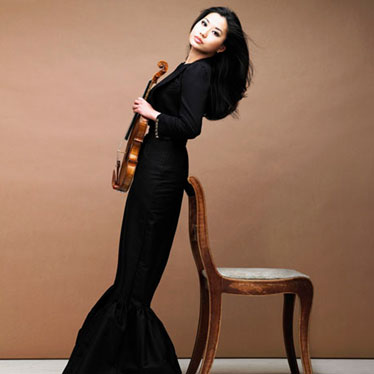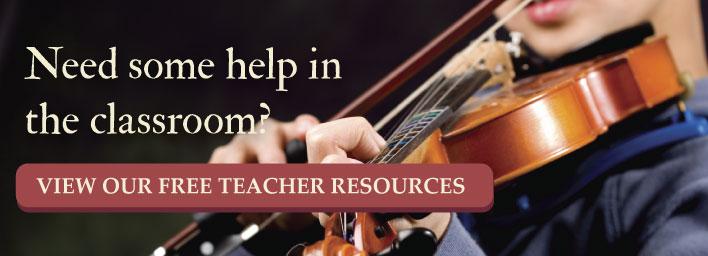30 Quotes By Famous Violinists

(Any violinist, from beginner to teacher, can find inspiration in the words of the world’s greatest violinists. Their insight on their craft, the violin, the arts, and life are all touchstones for our own personal and musical development.
As of Oct. 27, 2020, we've updated the following collection of inspirational quotes from violinists that have been sourced from a variety of websites, like BrainyQuotes, WikiQuote, and Quotes-Inspirational. Quotes taken from interview articles or videos include the relevant link.
Many of the famous violinists quoted below are featured in StringOvation Artist Spotlights and Profiles, in which case you can follow the hyperlinks embedded in their names to learn more about them. The last three quotes are taken from aspiring amateur violinists, who became famous for other reasons.
- Hilary Hahn: “What I do is creative. It doesn't seem like that when I'm playing a piece that was written in the past, but the score is just the outline and everything in it is relative. The key is to make this piece written by someone else belong to you and then connect to the audience.” (NEW)
- Jascha Heifetz: "The discipline of practice every day is essential. When I skip a day, I notice a difference in my playing. After two days, the critics notice, and after three days, so does the audience."
- Ivry Gitlis on conflict in music: "When people say, ‘This quartet is wonderful – the players all sound the same,’ it’s terrible. What is democracy? It’s not that everyone should think the same – that’s a dictatorship. A real democracy is where people are individuals, and because of that they have an interest in living together and they find things to agree or disagree with. When you play together you shouldn’t follow each other – you should each be yourself and get together somehow. Look at the Amadeus Quartet – each one of them was a completely different person, but what they did together was the most beautiful thing you can think of."
- Sarah Chang: "When you're very young and you play with an orchestra – I debuted with the New York Philharmonic – they call you a prodigy and that name sticks with you even when you're 15 or 16. What I liked even then, though, was that the conductors treated me like a colleague, not like a 'prodigy,' ... Then, when I would be invited back, it became a wonderful cycle for me: I would create friends at these places, such as New York and Berlin, and they have watched me grow up."
- Benjamin Beilman on a healthy approach to competitions: "In general, you learn to accept that it may not be your day, at all times. You have to focus on what you're getting out of the competition, regardless of the winners.” (NEW)
- Isaac Stern: "Music is the thousandth of a millisecond between one note and another; how you get from one to the other-that's where the music is."
- Ray Chen on the importance of creativity in the classical genre: “One of my biggest idols is Yo-Yo Ma -- he's incredibly creative, and he's an ambassador for classical music. Yehudi Menuhin was also like that...happy to cross into other worlds, into other fields. It was not necessary at the time, but he did it anyway. He saw a greater vision than simply walking on stage, performing, and then walking off again. Now we need this creatively more than ever.” (NEW)
- George Enescu: "The artist reveals to mankind the way to harmony, which is happiness and peace."
- Julia Fischer reveals that her favorite musician of all time is a pianist: "I’ve always been a huge Glenn Gould fan, and that never changed. With every other idol I’ve had, and I’ve had a few, of course…it went up and down. But Glenn Gould is the only one which my entire life has always been an idol."
- Midori Goto: "Honesty comes only with sound health, physically and psychologically, and an honest mind cannot be separated from the most genuine acknowledgment of expression. It should be recognized that pure perfection is unobtainable. Therefore, the realization that one's irrevocable faults and deficiencies must be faced, guides us toward the first step of learning. We must each accept any situation as it actually is, with dignity. In that fine balance of acceptance of self and the mission to better oneself, compassion, humility, and discipline are nurtured."
- Amadéus Leopold, a.k.a. Hahn-Bin, on the importance of expressing yourself onstage: “I was living a double life, where I was very much doing what other people expected of me on stage...now that I am revealing so much on the stage, it’s become this character, almost like a guardian angel for me—this person I created through makeup and fashion and colors. And I think that was what liberated me both personally and professionally.” (NEW)
- Joshua Bell: "Art and music is part of what it means to be a human being. And if you're neglecting that, you're basically ignoring a huge side of the brain and a huge side of what it means to be human."
- Janine Jansen: "A wrong note played with the right intention is much to be preferred to the right note played with no soul."
- Fritz Kreisler: "Genius is an overused word. The world has known only about a half dozen geniuses. I got only fairly near."
- Philippe Quint on the importance of a little-by-little approach: “Usually, you will find that in each passage, there are one or two shifts that are difficult, but everything else is fine. I like to compare my approach to the jigsaw puzzle: you have little small parts you put together, then eventually you have the big picture. But this is something that I learned many years later…” (NEW)
- Nigel Kennedy: "If you're playing within your capability, what's the point? If you're not pushing your own technique to its own limits with the risk that it might just crumble at any moment, then you're not really doing your job."
- Wil Baptiste (Wil B.) of Black Violin: “...as an artist we feel like that's what you're supposed to do. You're supposed to stretch the envelope. You're supposed to do things that are very uncommon. You're supposed to do things that are not the ordinary. You're supposed to push the boundaries. That's what artistic expression is.” (NEW)
- Gidon Kremer: "It is far more important that someone plays music for which they feel a special affinity and have something individual to say than mere technical perfection. Perfection is in itself limited – the message should take us beyond perfection."
- Yehudi Menuhin: "The violinist must possess the poet's gift of piercing the protective hide which grows on propagandists, stockbrokers and slave traders, to penetrate the deeper truth which lies within."
- Shinichi Suzuki: "Tone has the living soul."
- Viktoria Mullova on improvisation: "It was difficult at the beginning but the more we do it on stage the more fun it is. I started by studying some improvisation by Miles Davis and tried to play it in different keys to learn the language. It was terrifying at first. I couldn’t understand it or believe how people who improvise, especially on the violin, can play all these notes so fast. It seemed impossible. Then you realize there are patterns and it’s a language you can learn. But you have to have the time and inclination. You can’t just pick it up and start improvising. It’s a skill." (NEW)
- Niccolo Paganini: "In order to move others, I must be moved."
- Sirena Huang: “I remember when I was little, my mom asked me, 'Would you like to play the violin or the piano?' I looked at that giant monster and said to myself - I am not going to lock myself on that bench the whole day. This is small and lightweight. I can play from standing, sitting or walking” (Feel the same? Read Physical Movement for Violinists: How to Incorporate Dance and Movement Into Your Violin Performance).
- Itzhak Perlman: "If you put your hand on the piano, you play a note. It's in tune. But if you put it on the violin, maybe it is, maybe it isn't. You have to figure it out."
- Nicola Benedetti: I believe that people still want to feel, and to be moved...they want to communicate with loved ones better and we all want to feel we are not alone in the world.Music is the art of all the things we can't see or touch. We need it in our live." (NEW)
- Maxim Vengerov speaking at masterclass at the Royal Academy of Music: "Who says it has to be beautiful? Is nature always beautiful? Nature is beautiful because it’s not always how we expect it to be."
- Stéphane Grappelli, a famous jazz violinist and master of improvisation: When I improvise and I'm in good form, I'm like somebody half sleeping. I even forget there are people in front of me. Great improvisers are like priests; they are thinking only of their god.” (NEW)
- Charlie Chaplin, starring actor, comedian, and filmmaker of the Silent Movie Era: "Each week I took [violin] lessons from the theatre conductor or from someone he recommended. As I played left-handed, my violin was strung left-handed with the bass-bar and sounding post reversed. I had great ambitions to be a concert artist, or, failing that, to use it in a vaudeville act." Read about his use of music/violin in his movies here.
- Thomas Jefferson, third president of the United States and writer of the "Declaration of Independence." Excerpts from his and his contemporaries' personal letters tell us that Jefferson often played violin at social gatherings. An article from the "Thomas Jefferson Encyclopedia" states that "Jefferson wrote that music was 'invaluable,' and that it 'furnishes a delightful recreation for the hours of respite from the cares of the day, and lasts us through life.' "
- Marlene Dietrich, German actress from the Golden Age of Movies might be considered a professional violinist, as her first job in the theatre was playing violin in the pit orchestra for silent films. Her dream was to be a professional violinist, but she was fired after a month. A fitting end to this article, Dietrich was quoted as saying, "I love quotations because it is a joy to find thoughts one might have, beautifully expressed with much authority by someone recognized wiser than oneself."
If you want to hear from more musicians, you can read another collection of inspirational quotes here.
Above image of Sarah Chang photographed by Seihon Cho, courtesy of sarahchang.com


